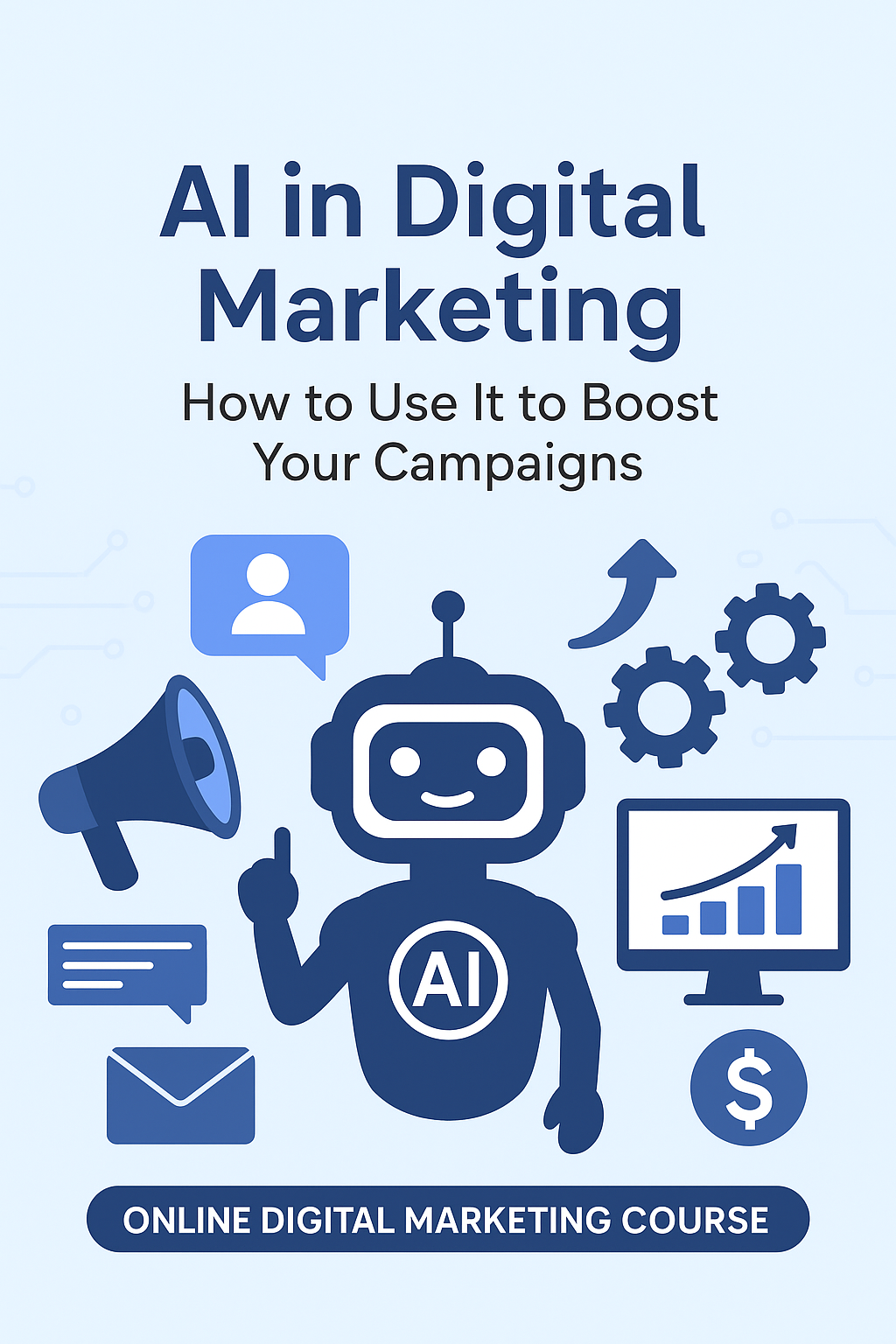
AI in Digital Marketing: How to Use It to Boost Campaigns | Online Digital Marketing Course Tips
-

- by jyoti.panjwani,
- August 16, 2025
- in services,
AI in Digital Marketing: How to Use It to Boost Your Campaigns
Artificial Intelligence (AI) has moved from being a futuristic concept to a practical tool that’s reshaping the way businesses approach marketing. From personalizing customer experiences to automating campaigns, AI can help you reach the right audience, at the right time, with the right message—while saving time and resources.
If you’re new to AI in marketing, this guide will explain how it works, why it’s so powerful, and how you can start using it to boost your campaigns. Many professionals now learn these skills through an online digital marketing course, which often includes AI tools and strategies in the curriculum.
Why AI is a Game-Changer in Digital Marketing
AI is capable of analyzing huge amounts of data quickly, recognizing patterns, and making predictions. In marketing, this means you can:
-
Understand your audience better
-
Create personalized content at scale
-
Automate repetitive tasks
-
Predict customer behavior
-
Optimize ad spend
Instead of guessing what works, AI uses data to make smart, evidence-based decisions—helping you get better results with less trial and error.
1. AI for Customer Insights
One of the biggest challenges in marketing is truly understanding your audience. AI-powered analytics tools can track user behavior, segment audiences, and even predict what products or services someone might want next.
Example: Tools like Google Analytics 4, HubSpot, and IBM Watson use AI to identify trends and recommend actions to improve engagement and sales.
Benefit: You’ll know exactly who to target and with what message—making your campaigns more relevant.
2. AI in Content Creation
AI tools like ChatGPT, Jasper, and Copy.ai can generate blog posts, ad copy, email subject lines, and social media captions in seconds. While human creativity is still essential, AI can speed up the process and help you brainstorm ideas.
Example: Need 10 Instagram captions for a new product launch? AI can create a list in under a minute.
Benefit: Save time, maintain consistency, and test multiple variations to see which performs best.
3. AI for Personalization
Personalized marketing increases engagement, loyalty, and sales. AI can personalize:
-
Product recommendations (like Amazon)
-
Email content (based on user behavior)
-
Website experiences (dynamic landing pages)
Example: Netflix’s AI-driven recommendation engine suggests shows you’re likely to watch based on viewing history.
Benefit: Customers feel valued and understood, which leads to higher conversion rates.
4. AI in Advertising
AI-powered ad platforms like Google Ads and Facebook Ads can automatically adjust targeting, bidding, and creative elements for maximum performance.
Example: AI can identify the best time to show an ad, the most effective audience segment, and the highest-performing visuals.
Benefit: Get more clicks and conversions without increasing ad spend.
5. AI in Email Marketing
AI can improve open rates and click-through rates by:
-
Choosing the best time to send emails
-
Crafting personalized subject lines
-
Segmenting your list based on behavior
Example: Tools like Mailchimp and ActiveCampaign use AI to optimize send times and predict customer engagement.
Benefit: More effective email campaigns with less guesswork.
6. AI Chatbots for Customer Service
AI-powered chatbots can answer common questions instantly, book appointments, and even process orders—24/7.
Example: A beauty brand’s chatbot could recommend skincare products based on a customer’s skin type and concerns.
Benefit: Reduce customer service costs while improving response time and satisfaction.
7. AI for SEO Optimization
AI can help you find the best keywords, optimize content, and predict search trends.
Example: Tools like Surfer SEO, Clearscope, and MarketMuse use AI to suggest improvements for blog posts so they rank higher on Google.
Benefit: Attract more organic traffic without spending on ads.
8. Predictive Analytics for Campaign Planning
AI can forecast how campaigns will perform based on historical data—helping you decide where to invest your time and budget.
Example: Predicting which customers are likely to unsubscribe so you can take action to retain them.
Benefit: Make smarter, data-driven marketing decisions.
How to Get Started with AI in Digital Marketing
-
Identify Your Needs – Do you need AI for content creation, ad optimization, or customer service?
-
Choose the Right Tools – Start small with free or affordable AI-powered tools.
-
Learn the Basics – Understanding how AI works in marketing will help you use it effectively.
-
Test and Optimize – AI is powerful, but human supervision is still important.
If you want a structured learning path, an online digital marketing course can teach you how to use AI tools for SEO, ads, content, and analytics—often with practical assignments and case studies.
Final Thoughts
AI isn’t here to replace marketers—it’s here to make them more effective. By using AI for insights, personalization, automation, and optimization, you can create campaigns that are smarter, faster, and more profitable.
The key is to start small, experiment, and keep learning. With AI on your side, your marketing strategy can be more targeted, efficient, and impactful than ever before.
And if you truly want to master this combination of creativity and technology, taking an online digital marketing course that covers AI applications could be the smartest step for your career or business growth.
0 Comments:
Leave a Reply